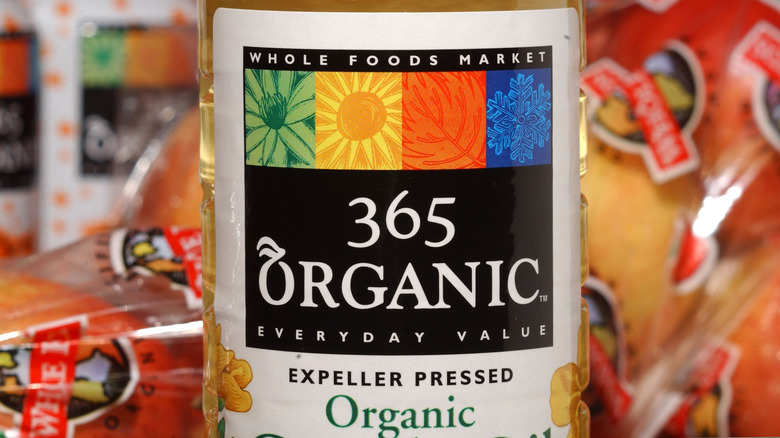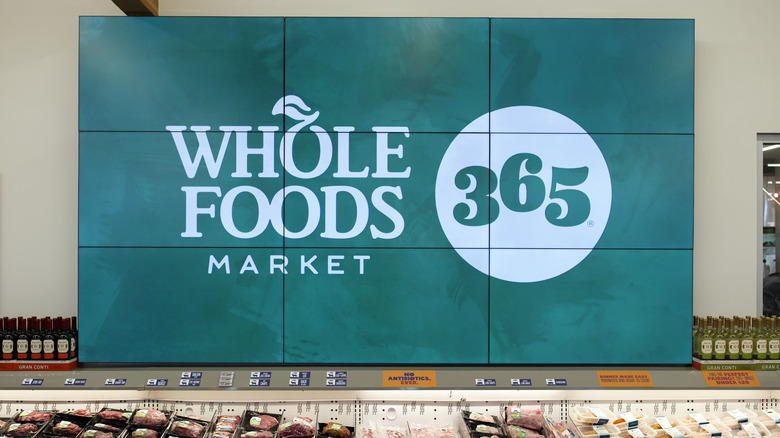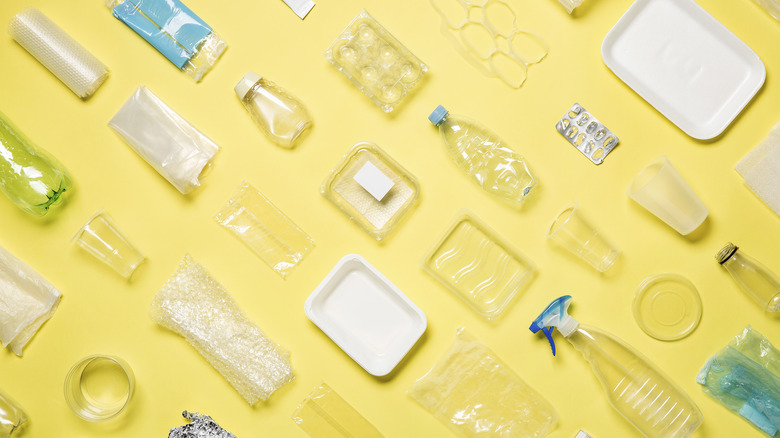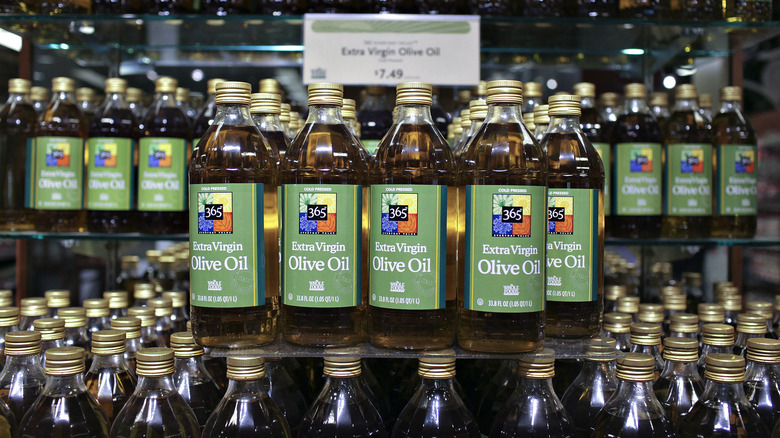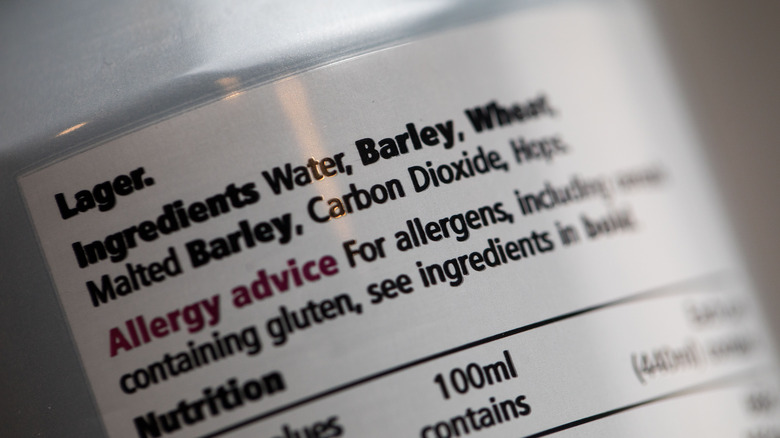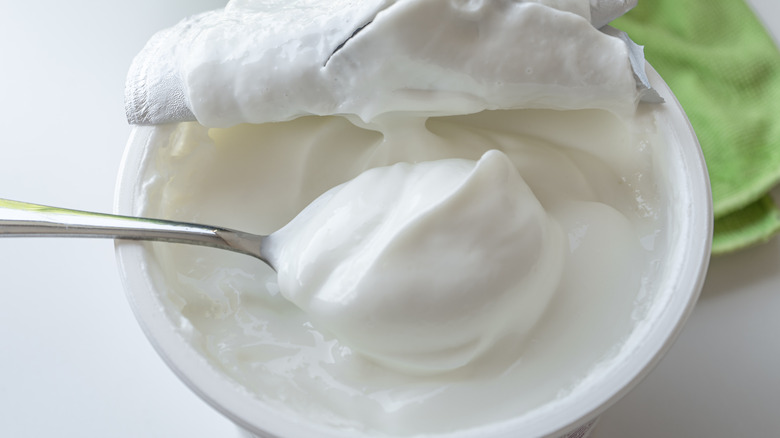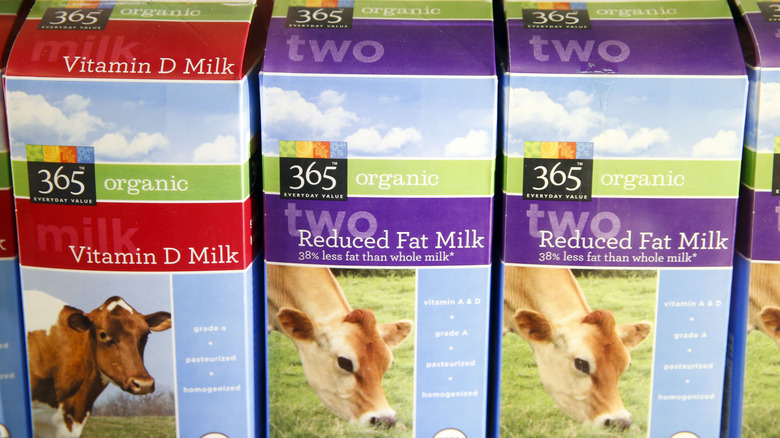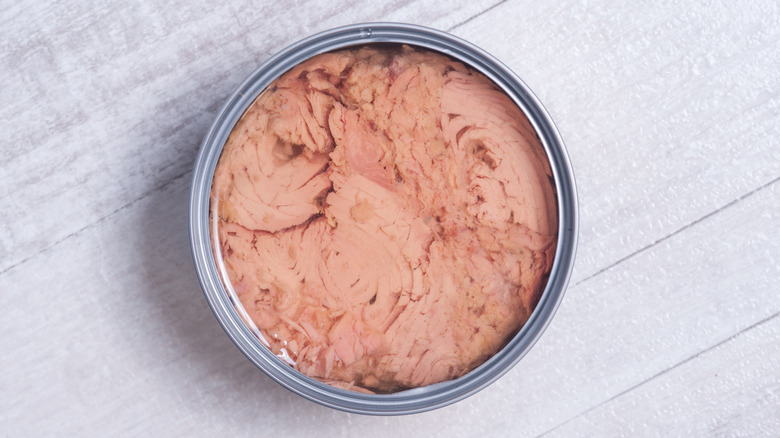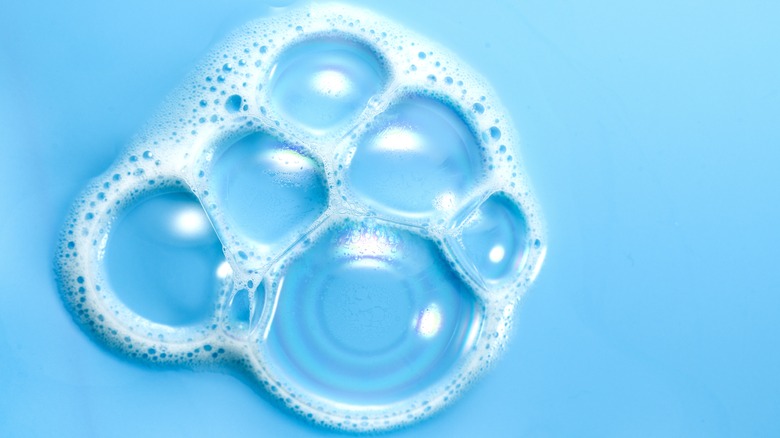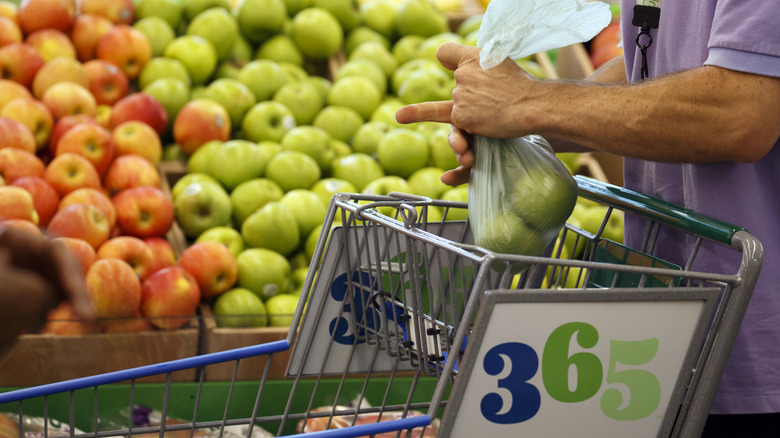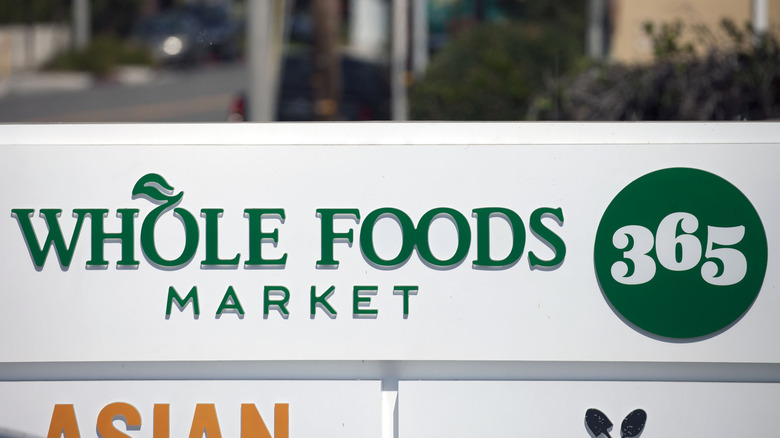365 By Whole Foods: 13 Things To Know About Its Products
Whole Foods is one of the world's most recognizable brands, but it wasn't always such a big operation. The first Whole Foods Market, based in Austin, Texas, was opened in 1980 and had just 19 people working there. Its ethos of providing fresh, natural, nutritious food to customers caught on, and the outfit has since expanded into the multinational business we know today.
If you thought that Whole Foods' emphasis on wholesome organic products makes its products off-limits to thriftier customers, though, you'd be mistaken. Its in-house brand 365 by Whole Foods Market, which was first launched in 1997, offers thousands of lower-cost products under the Whole Foods name, providing shoppers with value versions of everyday items. The company even launched a separate 365 chain in 2015. Although these stores originally looked promising, in 2019, Whole Foods announced it was closing these 365 offshoots and converting them to regular Whole Foods locations, leaving the 365 name applying solely to its in-house budget items.
Nowadays, you can find 365 items in-store at Whole Foods and on Amazon, with everything from all the essentials to stock your pantry with to fancier dinner party items available at the click of a button. If you've never bought 365 products before, though, you might want more detail before you add them to your cart. That's where we come in. From the ideology behind the products themselves to interesting specifics about certain items, we've got everything you need to know about 365 by Whole Foods.
1. 365 was named with freshness in mind
Whole Foods doesn't mess around when it comes to freshness. The retailer proudly proclaims itself to be the country's "first and only certified organic national grocer," holding itself to stringent standards around the organic origins of the products it sells and how they're shipped, stored, and handled. That commitment to freshness comes into play with its 365 brand, too. "The name is meant to be a signal that shoppers can find fresh and healthy foods at prices every day of the year that won't break the bank," consumer analyst Julie Ramhold tells Eat This, Not That.
Its branding also reflects this commitment to being able to fresh food on any day of the calendar. Look closely at the 365 logo on product packaging, and you'll see each of the four seasons symbolized in it. This design is meant to reflect the availability of the products whenever you want them and indicate that no matter when you buy them, they'll be fresh, healthy, and ready to consume.
2. A lot of care goes into the packaging
Whole Foods invests a lot of time and energy into its environmentally friendly and health-conscious outlook. That's seen not just in its products but in the packaging that contains them. The company has made several big strides in making its packaging as environmentally friendly as possible, with its 2022 Sustainability Report discussing its attempts to create sustainable alternatives for single-use plastics.
A notable step forward came that year when the company put several programs to reduce food and packaging waste into action, designed to bring down overall emissions. One of the most relevant of these to its 365 line is arguably its work with Amazon to launch "daily variable insulation," in which deliveries of products were tweaked to only use the insulating materials necessary. By the end of 2022, the company managed to avoid the equivalent of around 900 tons of needless packaging, a huge saving in an industry that's traditionally packaging-heavy.
Whole Foods also has robust recycling guidelines and practices in place for its products, both for packaging and leftover food. By doing this, it ensures that waste is kept out of landfills as much as possible.
3. Whole Foods doesn't make all its 365 products
If you've ever wondered where Whole Foods finds the time to create its thousands of products, we've got a little secret for you: It doesn't. Much like how other brands make Costco's Kirkland products, Whole Foods doesn't manufacture its 365 items a lot of the time. Instead, it utilizes a host of other companies.
So, who makes these items? It's not exactly clear. "Manufacturers are kept under lock and key. Whole Foods utilizes outside manufacturers for their 365 line of products, but they protect the information of exactly which brands are responsible for these products," Julie Ramhold notes to Eat This, Not That. For Whole Foods, doing this has a clear advantage: The company gets to put its label on a host of items without having to go to the hassle of sourcing factories, ingredients, and workers to make them, reaping the benefits (and, likely, the profit). However, it also has an advantage for the customer: Although it's unclear as to who makes 365's products, if it's anything like Costco, we wouldn't be surprised if the store partners with well-known brands that anonymize their items for Whole Foods' benefit. As such, you could be getting a quality product at a bargain price.
4. 365 personal care products are cruelty-free
Finding ethically minded beauty and personal care products can be pretty tricky, especially if you're trying not to spend too much money. However, you can breathe easy when buying Whole Foods' 365 items. 365 products are cruelty-free, meaning that they're not tested on animals. This is also true for the personal products that Whole Foods acquires and sells from elsewhere.
You'll be pleased to hear that this applies to all personal care products in the 365 line, not just cosmetics: Diapers, toothbrushes, deodorant, and laundry care items are all produced without any animal testing. Additionally, Whole Foods keeps its business out of markets that require animal testing by law, like mainland China, where animal testing is still mandatory for a number of types of cosmetics.
It's worth bearing in mind, however, that while Whole Foods doesn't conduct animal testing for its 365 products, it isn't certified cruelty-free by any external organizations — although this doesn't necessarily mean that it doesn't follow the same standards as other companies that are. As well as this, you should remember that Whole Foods' 365 items aren't 100% vegan, so if you do follow a strictly plant-based diet on an ethical basis, you may wish to consider checking out other stores for your items.
5. The products follow strict guidelines on their ingredients
Whole Foods is very proud of its organic products and the quality of its ingredients and holds them to strict standards. The company offers extensive information on its website about the standards it adheres to for all of its products, with a few commonplace, controversial ingredients completely banned from its stores. These include MSG (or monosodium glutamate), which Whole Foods banned in 1992, high-fructose corn syrup, banned in 2011, and several artificial additives, including aspartame, the sweetener used for diet cola.
As well as this, the company has an extensive list of food colorings, preservatives, and oils that it prevents from getting into its food. This doesn't mean, of course, that Whole Foods' 365 products are free of questionable ingredients or any preservatives whatsoever. The company states that it treats items on a case-by-case basis, and the list of things it keeps out of its food is ever-evolving. It's clear, however, that Whole Foods tries its level best to make its food as natural as possible, and while that may be difficult to achieve at times, you can stay safe in the knowledge that a lot of thought has gone into making each product not just tasty but safe.
6. 365 breakfast foods and snacks are a must-buy
Whole Foods sells thousands of products under its 365 brand, and not all of them will be your favorites. There are some 365 products, though, that you really shouldn't go without. 365's breakfast foods are a particularly good choice, not just because of their taste but because of their nutritional quality. Although some breakfast items are traditionally crammed with sugar and don't provide any real sustenance, 365 Buttermilk Protein Waffles, for example, have just 4 grams of added sugar and a whopping 12 grams of protein per serving, making them a great way to start your day.
The brand's snacks are also an awesome choice and often represent excellent value for money. The 365 Organic Original Hummus and 365 Organic Restaurant Style White Corn Tortilla Chips, for instance, cost way less than similar artisanally made products and provide the same great taste. We would also always recommend stocking up on 365's dry goods and canned items, particularly because they're so readily available online at the click of your mouse. Doing this can not only give you quality items at a good price but also allow you to save on the effort of lugging them home from the store.
7. 365 Greek yogurt got Whole Foods into hot water
Whole Foods projects an image of wholesomeness and honesty, but it hasn't always been completely transparent with customers. This fact came into sharp focus in 2014, via a humble container of Greek yogurt. An investigation by Consumer Reports dove into a tub of 365 Greek yogurt to check out whether its nutritional content was accurately shown on its label. Specifically, the organization tested six different samples of the fat-free yogurt to find out whether its listed sugar content of 2 grams per serving was the same across the board.
What it found was that the actual sugar content was higher — way higher. On average, the samples of Greek yogurt contained 11.4 grams of sugar, more than five times the amount listed on the label. As Consumer Reports pointed out, this is an issue not just because Whole Foods is so forthright about the healthiness of its products but because certain individuals, like those with diabetes, may face serious issues if they consume too much sugar inadvertently. The company was subsequently subject to several lawsuits in response.
8. You may wish to buy your milk elsewhere
Because Whole Foods is so serious about providing organic products wherever possible, you'd be forgiven for thinking that one of its most basic items, milk, is in line with its ethos. The truth, however, might be slightly more complicated. According to The Cornucopia Institute, a watchdog organization whose mission is to platform authentic organic food providers while holding the USDA's application of organic law to account, Whole Foods is not as rigorous about the organic nature of its milk as it should be.
"This brand is known or suspected to be practicing outside the letter and the intent of organic rules and regulations," The Cornucopia Institute says of Whole Foods' 365 milk. "They were the least transparent in Cornucopia's investigation and information was difficult to confirm outside of their participation." The organization goes on to say that the overall effect of Whole Foods stating that its 365 milk is organic, but not walking the walk, is one of damage to consumer trust and the market as a whole. The Institute recommends that instead of getting your organic milk from Whole Foods' 365 line, you should try to find it elsewhere.
9. 365 products have some fan favorites
Like other retailers, Whole Foods has a pretty passionate fanbase, and its customers routinely swap insider info about the best 365 products to purchase either online or in its stores. Well, we wouldn't keep that info from you, would we? 365's peanut butter is routinely praised by happy buyers, who love it both for its ingredients (just peanuts, no unnecessary additives) and its price. People also love 365's peanut butter-associated products, like its peanut butter cups, which frequently make their way into shoppers' weekly baskets.
The jarred pasta sauce is also definitely worth your money, especially as a replacement for name brands. 365 customers have pointed out that its tomato sauce is sometimes even better than more expensive and recognizable names like Rao's. Drinks-wise, people love 365's sparkling water, which provides way more fizz than you might expect for a lower-price product. If you're a fan of candy, too, you're in luck — as are Whole Foods' customers. Its 365-brand salted caramel chocolate-covered Oreo-style cookies, gummy bears, and organic ice cream sandwiches are all beloved by its regular purchasers and are a must-buy next time you're in one of its stores.
10. 365 fish products are held to rigorous standards
It can be notoriously difficult to buy fish products that come from ethical, sustainable sources. Luckily, if you're buying Whole Foods' 365 fish products, you can be fairly confident that they're the real deal. Whole Foods Market has a longstanding collaboration with the Marine Stewardship Council (or MSC) and has been working with the organization since 1999 to certify its seafood as being from a sustainable source. It also supplies sustainability ratings for its other products via the Monterey Bay Aquarium Seafood Watch program, again flagging how renewable its supplies are.
These standards are reflected in the very packaging of the products you buy. 365 No Salt Albacore Tuna cans, for example, proudly bear an MSC label, indicating the product's sustainability. It's also a non-GMO product and is contained in non-BPA cans. In keeping with Whole Foods' organic ethos that champions natural food at all costs, you'll also be pleased to see that this product, like many of its other seafood products, contains no additives or preservatives — just tuna and water.
11. Some of its products have provoked legal action
Many grocery stores have found themselves mired in scandals and have been subject to litigation by customers and larger bodies alike, and Whole Foods is no different. In fact, in 2008, it faced legal action from an entire state. California's attorney general filed a lawsuit against Whole Foods due to some of the ingredients that it put in its soap products, which were found to contain 1,4-dioxane. This substance was sometimes used as a solvent and an ingredient in personal care products, but it's also been flagged as a potential carcinogen.
The issue is that Whole Foods was accused of not flagging on the packaging that the ingredient was in its products. In response, a Whole Foods spokesperson said: "We have conducted our own investigation into the allegations that some of our products contain 1,4-dioxane and do not believe these products represent a health risk or are in excess of California's Proposition 65 safe harbor level for 1,4-dioxane," per the Los Angeles Times. It's cases like this why, although Whole Foods continues to make strides in prohibiting controversial ingredients, it's still a good idea to check the labels of your 365 products.
12. Some 365 items are way cheaper than other available options
If you want quality items at better prices, buying Whole Foods' 365 products is the way to go. Like other value-brand options from major retailers, 365 has a range of items that offer significant savings versus name-brand choices while still delivering quality. These savings are available both in-store and on Amazon, where 365 products are readily available.
One such item is oat milk. A 32-ounce carton of 365 by Whole Foods Market Original Oatmilk comes in at $3.19 on Amazon, or $0.10 per fluid ounce. By comparison, Oatly Barista Edition Oatmilk comes in at almost $2 more for the same quantity, costing $4.99, or $0.16 for every fluid ounce.
Buying 365's peanut butter, too, will help you make some serious savings. The brand's popular Creamy Peanut Butter with Salt, which contains just two ingredients (peanuts and salt, as you might expect), is $3.49 for a 16-ounce jar on Amazon. A comparable product, MaraNatha Organic Peanut Butter, will set you back $5.20 for the same quantity, and it contains both palm oil and sugar in addition to peanuts and salt. Buying your regular supermarket fish products from the 365 range can also help you save money, with its fish sticks several dollars cheaper per pound than options from competitors like Gorton's.
13. Whole Foods' support of local producers has been questioned
Although Whole Foods has built an image as a retailer that works extensively with local organic producers to source its products, it's not been without scrutiny. One of the most famous instances of this came in 2006, when professor and food activist Michael Pollan criticized the store in his book "The Omnivore's Dilemma," questioning how local, and how organic, Whole Foods' products truly are, particularly in instances where food items are shipped thousands of miles across the country. In response, then-CEO John Mackey wrote an open letter addressed to Pollan, refuting his claims. "I regret that you did not engage Whole Foods in any serious research about how Whole Foods Market actually does business or you would have discovered that we support local and small farm food production all over the United States as well as in other parts of the world," Mackey wrote, before taking great pains to outline multiple examples of how his stores stayed true to the company's mission.
Pollan responded with an open letter of his own, again pointing out the difference between the business's ambitions and the actual reality of its products. "I have trouble squaring some of your claims of support for local agriculture with what I see when I shop at Whole Foods. I see more signage about the importance of local produce than I see actual items of local produce," Pollan wrote (via MichaelPollan.com). We hope that these two have patched up their differences by now!
